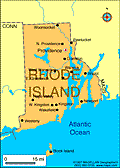 History From its beginnings, Rhode Island has been distinguished by its support for freedom of conscience and action: Clergyman Roger Williams founded the present state capital, Providence, after being exiled by the Massachusetts Bay Colony Puritans in 1636. Williams was followed by other religious exiles who founded Pocasset, now Portsmouth, in 1638 and Newport in 1639. Rhode Island's rebellious, authority-defying nature was further demonstrated by the burnings of the British revenue cutters Liberty and Gaspee prior to the Revolution; by its early declaration of independence from Great Britain in May 1776; by its refusal to participate actively in the War of 1812; and by Dorr's Rebellion of 1842, which protested property requirements for voting. Rhode Island, smallest of the 50 states, is densely populated and highly industrialized. It is a major center for jewelry manufacturing. Electronics, metal, plastic products, and boat and ship construction are other important industries. Non-manufacturing employment includes research in health, medicine, and the ocean environment. Providence is a wholesale distribution center for New England. Fishing ports are at Galilee and Newport. Rural areas of the state support small-scale farming, including grapes for local wineries, turf grass, and nursery stock. Tourism generates over a billion dollars a year in revenue. Newport became famous as the summer capital of high society in the mid-19th century. Touro Synagogue (1763) is the oldest in the U.S. Other points of interest include the Roger Williams National Memorial in Providence, Samuel Slater's Mill in Pawtucket, the General Nathanael Greene Homestead in Coventry, and Block Island.
|
Read this profile of Rhode Island to learn about the state's history, points of interest, and government. Also find interesting facts about each state, including the state's motto, symbols, and when it entered the union.




